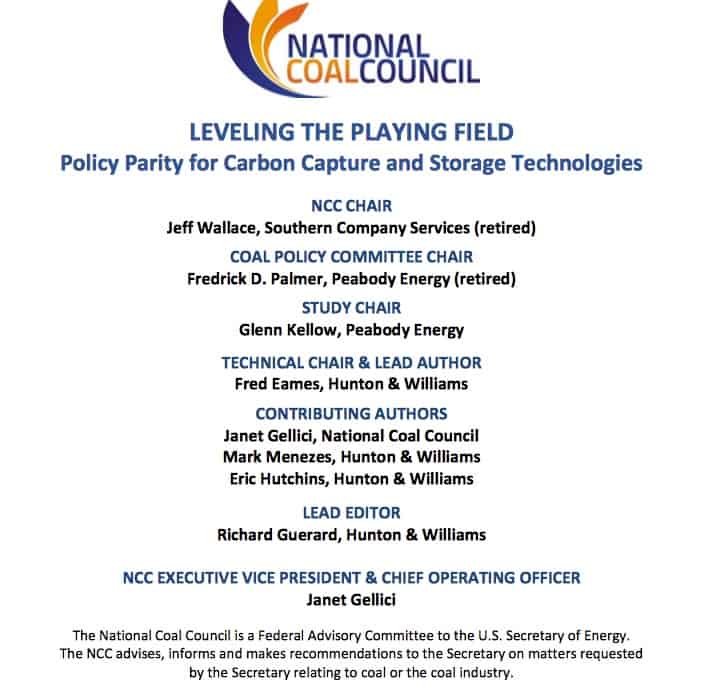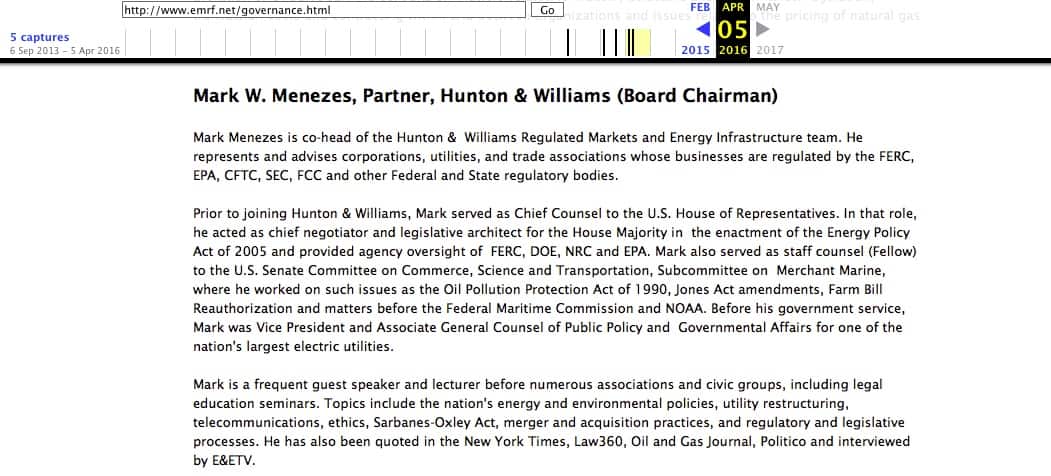The Trump Administration’s Department of Energy is set to gain yet another political appointee with a record of having worked on behalf of utility companies and fossil fuel interests with the nomination last week of Mark Menezes to be Under Secretary of Energy.
Menezes is currently Vice President of Federal Relations for Berkshire Hathaway Energy (BHE), a utility holding company which owns MidAmerican Energy, PacifiCorp and NV Energy, and is awaiting approval from Texas regulators to purchase Oncor. BHE also owns gas pipeline networks, transmission assets, and some renewable energy assets. If approved by the Senate, Menezes will join a growing list of political appointees within the Trump administration that can implement policies to benefit their former employers.
Menezes has spent decades working in the electric utility industry, mostly alongside corporate lobbying teams. More recently, he chaired a utility-backed front-group, the Electric Markets Research Foundation, in 2016. But his role as chief negotiator for the 2005 Energy Policy Act, the law that gave the Federal Energy Regulatory Commission (FERC) the authority to direct and approve reliability standards and impose penalties, may be the most useful skill that he brings to an administration that seems intent on finding ways to disadvantage renewable energy and support coal and nuclear power plants that are out of the market and being forced to retire.
Chief Negotiator for 2005 Energy Policy Act
The DOE job, if Menezes is appointed, will not be his first lap through the revolving door between utilities and government. After several years of working as a vice president on government affairs teams for American Electric Power, Menezes became Chief Counsel to the U.S. House Committee on Energy and Commerce for the House Republican Majority during several years of the Bush administration. He was chief negotiator for the 2005 Energy Policy Act. The law created and expanded many policies, such as the Renewable Fuel Standard, tax credits for wind energy production, and the DOE Loan Guarantee Program. It also exempted hydraulic fracturing from the Underground Injection Control provisions of the Safe Drinking Water Act.
The 2005 law also granted FERC the authority to oversee mandatory reliability standards governing the nation’s electricity grid. A primer on the law released by FERC states:
FERC also has authority to direct NERC [the North American Electric Reliability Corporation] to develop a new or modified Reliability Standard that addresses a specific reliability matter. FERC does not have the authority to write a Reliability Standard. FERC must approve a Reliability Standard before it may be enforced in the United States. An approved Reliability Standard may be enforced by NERC, and NERC’s enforcement of a Reliability Standard is subject to FERC’s review. FERC also may initiate a compliance action – including imposition of a penalty – independent of NERC … The authority Congress gave FERC under section 215 of the FPA pertains to the bulk power system … The statute also provides in section 215(i) that “Nothing in [section 215] shall be construed to preempt any authority of any State to take action to ensure the safety, adequacy, and reliability of electric service within that state,” as long as such action is not inconsistent with any Reliability Standard.
A utility-backed group that Menezes formerly chaired, Electric Markets Research Foundation, highlighted FERC’s authority in a 2014 report that said EPA and FERC have not paid enough attention to the “unintended consequences that may be created by the Clean Power Plan … EPA and FERC should be examining the potential reliability impacts of the Clean Power Plan as proposed, and the results of those studies should be considered in developing a final rule.”
Three years later, the Clean Power Plan has been withdrawn and is under review by EPA, but renewable energy continues to be added to the electric grid.
As reported in numerous outlets, Secretary of Energy Rick Perry has asked for a study that reviews regulations along with renewable energy sources and their impact on the country’s grid, because according to Perry, “over the last several years, grid experts have expressed concern about the erosion of critical baseload resources.” A leaked draft prepared by DOE career staff concludes that not only is the reliability of grid continuing to improve even as the country adds more and more renewable energy, but “high levels of wind penetration can be integrated into the grid without harming reliability.” Those draft findings, which are subject to change from the DOE political appointees, echo the findings of other DOE studies, and statements by the U.S.’s major grid operators.
Lobbying for the Utility and Coal Industry
After the stint on Capitol Hill, Menezes started at Hunton & Williams, where he became Partner in the regulated industries and government relations practice for the firm. From 2006 through 2016, Menezes lobbied on behalf some of the largest polluters in the country.
Simultaneously, some of these came companies were represented – and continued to be represented – by Hunton & Williams’ Utility Air Regulatory Group (UARG) in lawsuits against the Environmental Protection Agency to prevent clean air and water protections from becoming law. In fact, a July 2007 article explored how Hunton & Williams started to increase its lobbying practice, which also helped the firm grow its revenue. Jim Snyder of The Hill wrote,
The U.S. Supreme Court’s decision last April that the Environmental Protection Agency (EPA) could regulate greenhouse gases under the Clean Air Act was a loss for Hunton & Williams’s legal team, which had argued the opposite.
But the firm’s partners could take solace in one thing: The ruling seemed to validate their decision to build up a lobbying practice that could take a case from the court to Capitol Hill.
In Massachusetts v. EPA, Hunton argued that Congress did not intend to give the EPA powers to regulate carbon dioxide when it wrote the Clean Air Act. The court rejected that argument, ruling that EPA could regulate emissions from motor vehicles. It also required the agency to review its decision not to regulate other greenhouse gases as pollutants.
Not long ago, Hunton’s role in such a critical fight may have ended there, handing off responsibility to outside firms to argue on their clients’ behalf before Congress.
But by the time the court announced its ruling, the firm had built up a team of energy lobbyists who could field questions from clients and congressional staff about the decision’s implications — and work to minimize the potential damage to their clients through legislation.
“Suddenly, all of us were busy for the next two months,” said Mark Menezes, a former Republican counsel to the House Energy and Commerce Committee.
As Menezes’ filings show, he lobbied on behalf of nearly a dozen utility companies, along with the trade association the Edison Electric Institute, and oil companies such as Koch Industries and ConocoPhillips, during the years following Mass v. EPA.
Menezes then continued to lobby for utilities like American Electric Power, Southern Company, Xcel Energy, and Duke Energy during the time when the Waxman-Markey bill, the American Clean Energy and Security Act, was introduced and debated. The cap-and-trade bill was supported by many utilities, including AEP and Duke Energy, though their support was rooted in avoiding the EPA’s regulation of carbon dioxide, as well as the significant amount of allowances given to utilities in exchange for their support.
In recent years, Menezes has represented only Southern Company and Berkshire Hathaway. However, he has also done work to support of the coal industry’s interests. In 2015, he helped author the National Coal Council’s report, “Leveling the Playing Field: Policy Parity for Carbon Capture and Storage Technologies.” The report was requested by Secretary Moniz, and additional authors were also from Hunton & Williams, as well as Peabody Energy. The report argued for a variety of financial incentives for coal and utility companies to deploy CCS technology. Menezes and the authors also argued for a “baseload allowance” (emphasis added):
True parity would entail a mandatory market set-aside, akin to State renewable energy requirements … One mechanism to provide a market set aside is a “baseload allowance.” Fossil technologies that deploy CCS or other immature carbon reducing technologies and meet a defined carbon emissions rate while providing baseload power would be eligible for the credit … we recommend a Federal mechanism be explored to authorize a portion of any State-mandated RES to be met through use of qualifying low-carbon fossil baseload…

Menezes has also been involved with the utility-backed group Electric Markets Research Foundation (EMRF). He was listed as the board chair of EMRF as of 2016, but the website no longer lists Menezes’ involvement. EMRF has commissioned papers supporting utilities’ positions on issues like net metering and the need to extend the lifetimes of non-competitive coal and nuclear plants, and has distributed them to state utility commissioners at conferences of the National Association of Regulated Utility Commissioners.

Given his previous advocacy to bail out coal plants, Menezes will likely fit right in with some of his new peers in the political ranks of the Department of Energy, which includes a former executive of the Edison Electric Institute, and two appointees who had previously worked for fossil fuel-funded organizations. He will be well poised to continue serving the interests of his former employers.


[…] Mark Menezes, are both former lobbyists — Brouillette for Ford Motor Company and Menezes for power utilities. The industries they represented stood to lose money due to technological advances paid for by the […]
[…] Mark Menezes, are both former lobbyists — Brouillette for Ford Motor Company and Menezes for power utilities. The industries they represented stood to lose money due to technological advances paid for by the […]
[…] Mark Menezes, are each former lobbyists — Brouillette for Ford Motor Company and Menezes for power utilities. The industries they represented stood to lose cash as a result of technological advances paid for […]
[…] Mark Menezes, are both former lobbyists — Brouillette for Ford Motor Company and Menezes for power utilities. The industries they represented stood to lose money due to technological advances paid for by the […]
[…] y su subsecretario, Mark Menezes, son ex cabilderos: Brouillette para Ford Motor Company y Menezes. para empresas de energía. Las industrias a las que representaban podían perder dinero debido a los avances tecnológicos […]
[…] Mark Menezes, are both former lobbyists — Brouillette for Ford Motor Company and Menezes for power utilities. The industries they represented stood to lose money due to technological advances paid for by the […]
[…] Designate Menezes, are both outmoded lobbyists — Brouillette for Ford Motor Company and Menezes for energy utilities. The industries they represented stood to lose money attributable to technological advances paid […]
[…] Mark Menezes, are both former lobbyists — Brouillette for Ford Motor Company and Menezes for power utilities. The industries they represented stood to lose money due to technological advances paid for by the […]
[…] Mark Menezes, are both former lobbyists — Brouillette for Ford Motor Company and Menezes for power utilities. The industries they represented stood to lose money due to technological advances paid for by the […]
[…] Mark Menezes, are both former lobbyists — Brouillette for Ford Motor Company and Menezes for power utilities. The industries they represented stood to lose money due to technological advances paid for by the […]